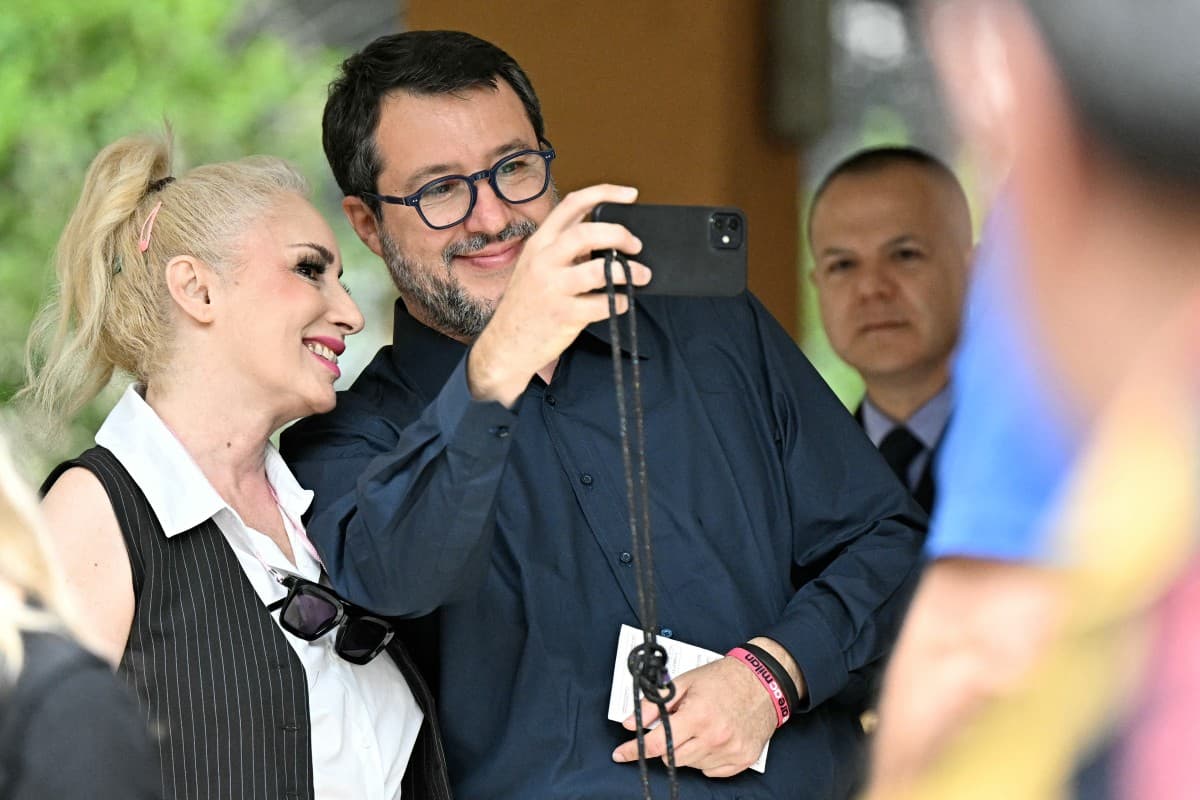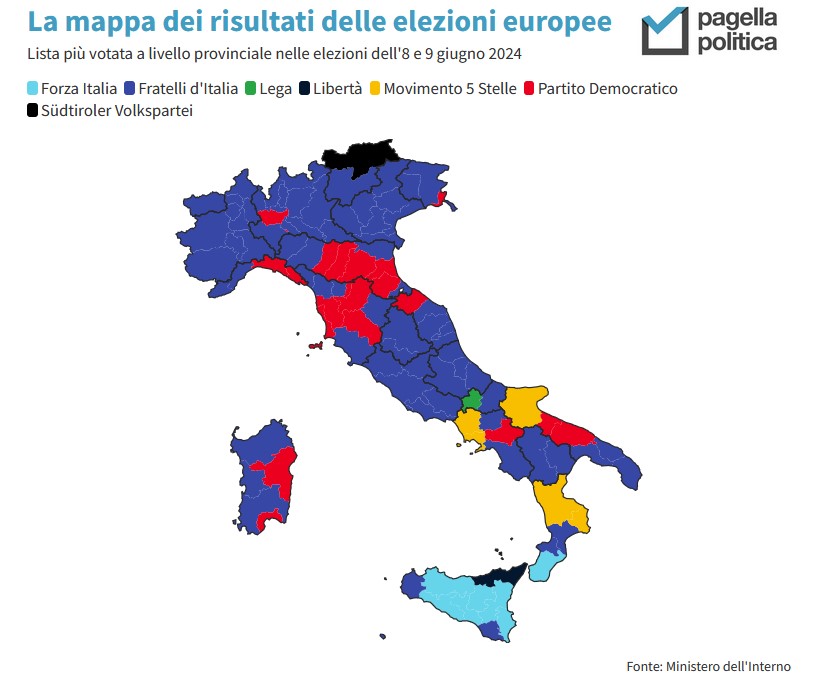KEY POINTS: Who are the winners and losers of Italy's EU election?

Giorgia Meloni's party triumphed as expected, but there were surprises for some in the EU election, which saw her hard-right coalition partners take a major hit.
The European parliamentary elections provided some shock results, particularly French President Emmanuel Macron's announcement late on Sunday night of a snap election after a dismal result for his party (our sister site The Local France has full coverage of what's happening.)
In Italy there were no such big surprises, with the vote going largely as expected - in Prime Minister Giorgia Meloni's favour - though some of Italy's key political players were left sorely disappointed, while commentators noted that the results could have a major impact on domestic and international politics.
READ ALSO: What we learned from the European elections across Europe
As the final votes are counted, these are the key stats and takeaways based on preliminary results on Monday afternoon:
Meloni one of few successful EU leaders
Giorgia Meloni's post-fascist Brothers of Italy (FdI) party had secured 28.82 percent of the vote on Monday with 97 percent of all votes counted - surpassing the 26 percent she secured in September 2022 national elections.
This made the Italian prime minister one of few leaders in Europe to emerge stronger after the vote.
"It is very important politically and also moving personally," she told Rtl radio on Monday afternoon. "Italy is going completely against the trend."
Speaking earlier on Monday, she said the result, coming just days before she hosts G7 leaders in Puglia, means Italy "presents itself at the G7 and in Europe with the strongest government of all."

European election results by Italian region. Map: Pagella Politica
Meloni controversially stood as an EU election candidate herself, using her personal popularity to give her party a boost at EU level. She pitched the weekend elections for the European Parliament as a referendum on her leadership, asking voters to write "Giorgia" on their ballots.
She will not take up her seat, as being an MEP would mean giving up her position in the Italian government: instead, votes for "Giorgia" will go to other candidates on her party's list.
Disappointment for Salvini at poor results
Meloni hailed the success of her entire government in the vote, AFP reported on Monday, but her coalition partner Matteo Salvini saw a slump in support for his far-right, anti-immigration League party.
Salvini had triumphed with 34 percent in European Parliament elections back in 2019, but has since been eclipsed by Meloni, taking only 9 percent of the vote this time around.
There were "malumori" ('bad moods') at League headquarters on Monday, reported La Repubblica, with senior members saying the party needed to "reflect" on its strategy after being surpassed by the third coalition partner, Forza Italia (FI): the right-wing party founded by late ex-premier Silvio Berlusconi took 9.62 percent.
Salvini may now face a leadership challenge following criticism of his election campaign.
His choice of disgraced former army general Roberto Vannacci as the League’s star candidate faced resistance from some high-ranking members, including the party’s founder Umberto Bossi, who instead voted for Forza Italia.
By contrast it was an unexpectedly good night for Meloni's main opposition, the centre-left Democratic Party (PD), which secured 24.08 percent of the vote - more than had been predicted.
PD leader Elly Schlein on Monday hailed the result as "extraordinary", noting that her party had seen more growth than any other, and saying: "Meloni, we're coming."
The Five Star Movement (M5S) led by former premier Giuseppe Conte meanwhile came in at 9.99 percent, also lower than in previous EU votes.
Meloni's party is now expected to send 25 MEPs to Brussels, while PD have 20, and M5S, FI and the League 8 each.
#elezionieuropee: stima dei seggi aggiornata. Con la nuova proiezione Forza Italia guadagna un seggio rispetto al 2019. pic.twitter.com/LnZnWFXkCr
— YouTrend (@you_trend) June 10, 2024
Student vote
The smaller parties on the chart include AVS, the left-wing Allianza Verdi Sinistra (Left and Green Alliance) which also had a better result than expected.
This was partly attributed to the fact that, this time, Italian students living outside of their hometowns were able to vote from their current city of residence.
Among the student group, AVS took a huge 40 percent of the vote, with PD coming second with 25 percent and centrist party Azione taking 10 percent.
Nel voto degli studenti #fuorisede trionfa Alleanza Verdi Sinistra, che supera il 40%. Segue il PD (25,5%) e in terza posizione Azione (10,2%).#maratonaYouTrend pic.twitter.com/M7PESP1Iz8
— YouTrend (@you_trend) June 10, 2024
They were followed by M5S (7.8 percent) and the lesser-known pro-European party Stati Uniti d'Europa (SUE).
All three parties forming the ruling hard-right coalition government trailed behind, with Brothers of Italy taking just 3.4 percent of the student vote. Salvini's League received precisely 93 student votes, noted Youtrend.
Italian voter turnout at all-time low
Italy's EU election vote, which coincided with local and municipal elections in many parts of the country, saw the lowest turnout on record, dropping below the 50 percent mark for the first time to 49.6 percent.
The Italian region with the highest turnout was Umbria (61 percent), while Sardinia saw the lowest (37 percent), according to interior ministry data.
Commenting on the low turnout in Italy, Meloni told Rtl radio on Monday that voters' lack of interest in the European elections showed how Brussels was perceived by many as "distant" and that it needed to be "better at listening to citizens."
However, across Europe as a whole turnout was at the highest level in 20 years at around 51 percent, according to provisional EU data.
Comments
See Also
The European parliamentary elections provided some shock results, particularly French President Emmanuel Macron's announcement late on Sunday night of a snap election after a dismal result for his party (our sister site The Local France has full coverage of what's happening.)
In Italy there were no such big surprises, with the vote going largely as expected - in Prime Minister Giorgia Meloni's favour - though some of Italy's key political players were left sorely disappointed, while commentators noted that the results could have a major impact on domestic and international politics.
READ ALSO: What we learned from the European elections across Europe
As the final votes are counted, these are the key stats and takeaways based on preliminary results on Monday afternoon:
Meloni one of few successful EU leaders
Giorgia Meloni's post-fascist Brothers of Italy (FdI) party had secured 28.82 percent of the vote on Monday with 97 percent of all votes counted - surpassing the 26 percent she secured in September 2022 national elections.
This made the Italian prime minister one of few leaders in Europe to emerge stronger after the vote.
"It is very important politically and also moving personally," she told Rtl radio on Monday afternoon. "Italy is going completely against the trend."
Speaking earlier on Monday, she said the result, coming just days before she hosts G7 leaders in Puglia, means Italy "presents itself at the G7 and in Europe with the strongest government of all."

Meloni controversially stood as an EU election candidate herself, using her personal popularity to give her party a boost at EU level. She pitched the weekend elections for the European Parliament as a referendum on her leadership, asking voters to write "Giorgia" on their ballots.
She will not take up her seat, as being an MEP would mean giving up her position in the Italian government: instead, votes for "Giorgia" will go to other candidates on her party's list.
Disappointment for Salvini at poor results
Meloni hailed the success of her entire government in the vote, AFP reported on Monday, but her coalition partner Matteo Salvini saw a slump in support for his far-right, anti-immigration League party.
Salvini had triumphed with 34 percent in European Parliament elections back in 2019, but has since been eclipsed by Meloni, taking only 9 percent of the vote this time around.
There were "malumori" ('bad moods') at League headquarters on Monday, reported La Repubblica, with senior members saying the party needed to "reflect" on its strategy after being surpassed by the third coalition partner, Forza Italia (FI): the right-wing party founded by late ex-premier Silvio Berlusconi took 9.62 percent.
Salvini may now face a leadership challenge following criticism of his election campaign.
His choice of disgraced former army general Roberto Vannacci as the League’s star candidate faced resistance from some high-ranking members, including the party’s founder Umberto Bossi, who instead voted for Forza Italia.
By contrast it was an unexpectedly good night for Meloni's main opposition, the centre-left Democratic Party (PD), which secured 24.08 percent of the vote - more than had been predicted.
PD leader Elly Schlein on Monday hailed the result as "extraordinary", noting that her party had seen more growth than any other, and saying: "Meloni, we're coming."
The Five Star Movement (M5S) led by former premier Giuseppe Conte meanwhile came in at 9.99 percent, also lower than in previous EU votes.
Meloni's party is now expected to send 25 MEPs to Brussels, while PD have 20, and M5S, FI and the League 8 each.
#elezionieuropee: stima dei seggi aggiornata. Con la nuova proiezione Forza Italia guadagna un seggio rispetto al 2019. pic.twitter.com/LnZnWFXkCr
— YouTrend (@you_trend) June 10, 2024
Student vote
The smaller parties on the chart include AVS, the left-wing Allianza Verdi Sinistra (Left and Green Alliance) which also had a better result than expected.
This was partly attributed to the fact that, this time, Italian students living outside of their hometowns were able to vote from their current city of residence.
Among the student group, AVS took a huge 40 percent of the vote, with PD coming second with 25 percent and centrist party Azione taking 10 percent.
Nel voto degli studenti #fuorisede trionfa Alleanza Verdi Sinistra, che supera il 40%. Segue il PD (25,5%) e in terza posizione Azione (10,2%).#maratonaYouTrend pic.twitter.com/M7PESP1Iz8
— YouTrend (@you_trend) June 10, 2024
They were followed by M5S (7.8 percent) and the lesser-known pro-European party Stati Uniti d'Europa (SUE).
All three parties forming the ruling hard-right coalition government trailed behind, with Brothers of Italy taking just 3.4 percent of the student vote. Salvini's League received precisely 93 student votes, noted Youtrend.
Italian voter turnout at all-time low
Italy's EU election vote, which coincided with local and municipal elections in many parts of the country, saw the lowest turnout on record, dropping below the 50 percent mark for the first time to 49.6 percent.
The Italian region with the highest turnout was Umbria (61 percent), while Sardinia saw the lowest (37 percent), according to interior ministry data.
Commenting on the low turnout in Italy, Meloni told Rtl radio on Monday that voters' lack of interest in the European elections showed how Brussels was perceived by many as "distant" and that it needed to be "better at listening to citizens."
However, across Europe as a whole turnout was at the highest level in 20 years at around 51 percent, according to provisional EU data.
Join the conversation in our comments section below. Share your own views and experience and if you have a question or suggestion for our journalists then email us at [email protected].
Please keep comments civil, constructive and on topic – and make sure to read our terms of use before getting involved.
Please log in here to leave a comment.